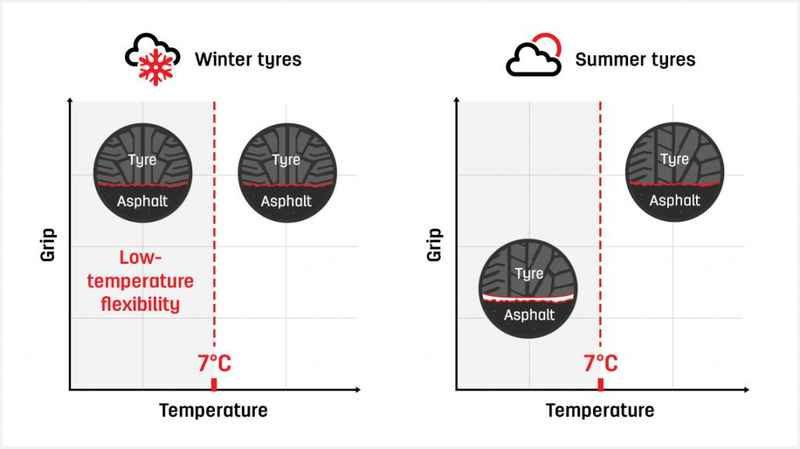The thing that stings about winters the most are the snow covered roads that play spoilsport to our plans year in, year out. Every year, thousands of people stay indoors due to the fear of driving on such roads and losing control. The simple fact is that we lack the confidence to drive on snow/ice simply because we do not possess the right equipment to tackle such weather. We witness accidents, cars sliding all over the road, but is there anything that can help us avoid such mishaps? Well, turns out there is and its called a winter tyre.
Winter tyres have for long been the go-to solution for our winter driving problems. Many countries have in fact made it mandatory by law to use only winter tyres during the winter season.
Winter tyres are built with the conditions of the winter season in mind. The roads are mostly covered with snow, water or ice and most importantly, the roads are cold.
Try this the next time you're out during winters, touch the concrete with your bare hands and see how cold it is. Regular summer tyres are simply not made for such conditions. The cold tarmac and the snow simply make your summer tyres incompetent.
Winter tyres, on the other hand, have some ingenious features that help you deal with such conditions. The winter tyre is designed with deeper and wider grooves and possess at least an extra millimetre of depth. These grooves when near the surface, expand and create a suction ( low pressure in the grooves) that sucks in the extra snow and water on the road. This helps the tyre maintain contact on the road.
How are they made?
The interplay between a tyre's rubber compound and the road changes as temperatures rise and fall. This affects the tyre's grip.
Winter tyres need to remain soft during winters and hence have more natural rubber content which allows them to stay softer. Summer tyres often harden if temperatures go below 7 degrees Celcius whereas winter tyres due to their higher natural rubber content and silica retain their flexibility even in very low temperatures.
Also See: All Season Tyres Explained: What Is So Special About Them?
How do winter tyres work?

Winter tyres work essentially due to their lower temperature flexibility as well as their deep grooves. The flexibility and the grooves basically help them in two ways. One is that they allow the tyres to "bite" into the snow by acting as teeth to grapple compacted snow effectively. Second, if the tyre nears the road's surface, the grooves widen, creating a low-pressure area which sucks in the water and the snow, clearing the path for the tyre to be in contact with the road, thereby increasing grip. This process ensures proper braking and more traction. The tyres don’t just function well when the surface is covered with water or snow but also cold roads.
The name "winter tyres" might fool you into thinking that they’re snow tyres but in reality, they're essentially cold weather tyres that are capable of performing not only on ice and snow but also on wet and dry cold roads. Their softer compound makes it easier for them to grip roads at colder temperatures in comparison to summer and all-season tyres which are made of harder compounds.
Their grooves are also deeper which allows them to gather and hold more amounts of snow and water than a usual tyre, that helps them grip on packed snow, and disperse large amounts of water to reduce the risk of aquaplaning.
What are the benefits of winter tyres?
- They are very good at gripping cold roads, be it wet, dry, snowy or icy.
- They stay flexible in winters which allows the sipes to "bite" into even the most heavily compacted snow which improves traction and grip.
- Consist of extra deep treads that excel at dispersing water and snow, thereby helping in reducing the chances of aquaplaning and loss of traction in general.
- Do not wear due to cold weather and still remain flexible in such temperatures. Much better than summer tyres in terms of safety as well as cost.
What are the disadvantages of winter tyres?
- Not ideal for summers just as summer tyres are not ideal for winter conditions. Once temperatures rise above +7 degrees C you will need to replace your winter tyres with summer tyres.
- Buying a full set of winter tyres is costly. There is also the additional responsibility of storing them properly. In some countries, you have no option, while in others an all-season tyre may be suitable.
- Work best in extreme conditions only. For mild to moderate winters with little or no snow, summer tyres or all-weather tyres are still the choice of many people.